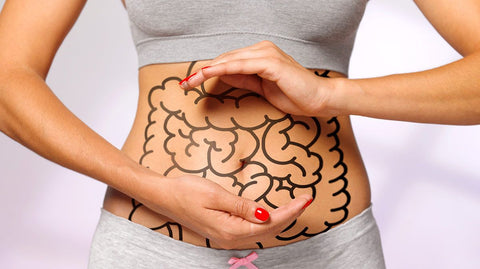It is normal to feel more sensitive during your period, not all women are affected equally; however, mood swings, sadness or bad temper are natural.
We must also keep in mind that it is very important to talk about menstruation and express our emotions. We must not be afraid of appearing sad or feeling down, and much less be ashamed to talk about our period... explain to your friends how you feel and why you feel that way and they will undoubtedly be able to help you.
So don't treat your period as a taboo subject. Addressing the topic naturally is the first step to taking its effects seriously.
A lot of things happen in a month...
In a 28-day menstrual cycle, we can distinguish two parts of approximately 14 days each. In the two phases of the menstrual cycle, we can go from being euphoric to not wanting anything to do with anyone.
Estrogen and progesterone, two hormones with cyclical variations, cause these changes month to month and thanks to this hormonal activity, your endometrium sheds every 28 days and menstruation appears, after which it will regenerate again.
In the first half of your cycle (day 1 to 14) you have your period, which usually lasts about 5 days, although it can also vary between 3 and 7 days. Generally, 70% of the losses occur during the first two days and in the last two days, we can already say goodbye to menstrual flow.
What happens in this first phase? Estrogen floods your body, and this is when the egg matures and is expelled from the ovary, which is known as ovulation. The egg begins a journey through the fallopian tube to the uterus.
In the first week you may feel more tired because your immune system and energy are weakened, but you may also feel less bloated because you have gotten rid of fluid retention.
In the second week, your energy increases, you perform better, and your skin and hair shine like never before thanks to estrogen. When ovulation is near, your libido shoots up, making it easier to get excited and reach orgasm during these days.

And during the second half of the cycle
During the second half of your menstrual cycle, from day 15 to day 28, changes can make you feel a little weaker. During this period, there is an increase in progesterone , which begins 2 or 3 days after ovulation.
In the third week, an imbalance between estrogen and progesterone levels or still low levels of both hormones can cause mood swings.
In the fourth week, the last, premenstrual syndrome causes a feeling of exhaustion that makes everything almost twice as hard… the accumulation of liquids can make you gain a few kilos and cause some discomforts such as heaviness, bloating, nausea or constipation, although these disappear with the arrival of your period. Your period is the starting point for the next cycle… unless you get pregnant.
The different phases of the menstrual cycle alter the chemical balance of the brain, which is why, depending on the part of the cycle you are going through, your body and emotions will behave in one way or another.
However, menstruation is only one of the processes that form part of the very complex menstrual cycle, made up of different phases:
Follicular . During this phase, a follicle-stimulating hormone is released. The function of this hormone is to cause follicles to be produced. These, in turn, release a hormone called estradiol. During this process, the endometrium begins to grow.
Ovulatory . During this phase, the egg is released thanks to the secretion of a luteinizing hormone. When the egg is released, the fertilization period begins. This period lasts one day.
Luteal . The ovaries release estrogen and progesterone, these hormones cause the endometrium to enlarge so that the fertilized egg stays inside. When the eggs are not fertilized, the endometrium separates.
Menstruation is the result of all these processes.

How does the menstrual cycle affect emotions?
During the menstrual cycle and its different phases we can experience abdominal pain, fatigue, pain in the legs or breasts, flow with more or less density, mood swings ...
Furthermore, before menstruation, usually a week before, estrogen and progesterone levels decrease, which is why premenstrual syndrome often occurs, which causes sadness, irritability, anxiety, headaches, back pain, diarrhea, or lack of concentration, among others.
We must take into account that during this process many hormonal changes are taking place in our body that affect our emotional side… at this time, you must be understanding with yourself and understand that these changes are beyond your control. Do not blame yourself for being discouraged or irritated, it is completely normal and will eventually pass.

The role of stress
Stress can cause a constant release of gonadotropin-releasing hormone and therefore a menstrual cycle will not start.
In addition to gonadotropins, the pituitary gland produces other hormones such as thyroid-stimulating hormone, and when there is an alteration, either an increase or a defect in the thyroid, alterations in the menstrual cycle can occur.
Another hormone produced by the pituitary gland is prolactin, which is responsible for milk production during lactation. An increase in prolactin above the expected level during a period when a woman is not breastfeeding can cause alterations in the menstrual cycle. A frequent cause of increased prolactin is stress, and this is another mechanism by which stress can alter the menstrual cycle.
Relaxation techniques are effective in combating this, as well as regular exercise. If this does not help regulate menstrual cycles, hormonal treatment, such as oral contraceptives, may be prescribed to ensure that menstruation occurs every month.

What are Premenstrual Syndrome (PMS) and Premenstrual Dysphoric Disorder (PMDD)?
Premenstrual syndrome is the name given to the set of symptoms, both physical and emotional, that women may experience a few days before menstruation and is mainly due to hormonal changes.
These include anxiety about eating certain foods and an increase in appetite, sensitivity, enlargement and even pain in the breasts. Also common are headaches, fluid retention, slight weight gain, muscle, joint or digestive discomfort, dizziness, unusual fatigue, the appearance of spots... and an unusual feeling of sadness that can be experienced as depression, tension, anxiety, unexplained changes in mood, sudden crying, unusual bad mood, introspection, difficulty concentrating, sleep and sexual desire disorders, etc.
Premenstrual dysphoric disorder is a severe, sometimes debilitating extension of premenstrual syndrome. Although both disorders have similar physical and emotional symptoms, premenstrual dysphoric disorder causes extreme mood swings that can disrupt daily life and damage relationships.

https://fivdona.com/cambio-humor-regla/
https://www.msdmanuals.com/es/hogar/salud-femenina/biolog%C3%ADa-del-aparato-reproductor-femenino/ciclo-menstrual
https://www.ausonia.es/es-es/articulos/mi-regla/que-nos-occurre-a-lo-largo-de-cada-ciclo-menstrual
https://www.mayoclinic.org/es/diseases-conditions/premenstrual-syndrome/expert-answers/pmdd/faq-20058315
https://www.siquia.com/blog/ciclo-menstrual-y-emociones





Comments (0)
There are no comments for this article. Be the first one to leave a message!